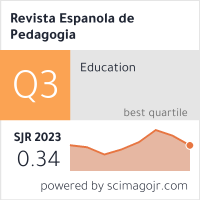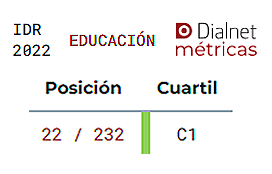Ruiz-Corbella, M., & García-Gutiérrez, J. (Eds.) (2019). Aprendizaje-Servicio. Los retos de la evaluación [Service learning: The challenges of evaluation] (Andrea Muñoz Villanueva)
Resumen
Towards the end of the 20th century, a series of innovative educational projects started appearing in higher education in Spain based on the methodology now widely known as service-learning. As a result of these projects, Spanish universities have advanced greatly in knowledge and understanding of the world their students inhabit. This movement has, to some extent, involved setting aside certain traditional teaching approaches and moving towards a revolution in teaching-learning processes; towards the need to seek out new directions in which students play a central role in their own learning based around their lived experiences of encountering real situations and problems in their immediate environment. ,
The authors of the work reviewed here do appear to agree on one point: the need to implement service-learning projects that enrich students’ learning on the basis of different activities that foster their civic participation as a tool for social change, creating an ethical commitment among students to the service they provide to the
community. ,
In the context of the theory and practice of teaching, we encounter one of the challenges that affects our educational system: evaluation. Indeed, from the first moments after our birth, we are exposed to a series of evaluation tests. More specifically, this is our first contact with a method of evaluation, and without us knowing, this precise moment corresponds with the start of a life bound to what we now call evaluation. As the years pass, without us realising, we are submitted to different methods of evaluation every
day, everything from medical tests to job interviews and university entrance tests.
This led us to reflect on the need to search the scientific literature for works on evaluation processes and more specifically on the topic that interests us here: evaluating service-learning projects. This is the start of this challenge, more specifically, the challenge of all of the authors in this work, with an evaluation of this type of teaching-learning proposal to enable their analysis and so be able to improve them. ,
The book’s editors, Marta Ruiz- Corbella and Juan García-Gutiérrez, work at Spain’s Universidad Nacional de Educación a Distancia (UNED) and both have numerous publications on this topic. In the text, they lead the reader through the academic literature on evaluation systems in service-learning projects. To do this, they call on a number of authors who are experts in this methodology from different Spanish universities and from the Latin American Centre for Service Learning (CLAYSS) in Argentina, a pioneer in this field in South America. ,
The contributions of the different authors are arranged in eleven chapters that focus on different aspects to consider when evaluating service-learning. In effect, when reading this work, we encounter numerous instruments for collecting information in all of the evaluation processes for projects and programmes implemented using this methodology. This makes it an excellent resource for readers who are starting out in research in this field, for ones who are already immersed in the specific scientific literature, and above all for ones who are developing a service-learning project or programme and are interested in knowing its effects on students’ learning and on improving society. ,
In other words, it is an essential text for the integration of systematic evaluation processes in this methodology, something that is necessary to provide a more objective and well-founded vision of each of the service-learning programmes. Until now, as well as being one of the most complex research problems in the field, this aspect has not received sufficient attention, and so it is one of this book’s principal innovative contributions. Hence the book’s title. ,
Evaluation processes are necessary in every educational project or programme, but complying with this requirement often turns out to be no easy task. We should work hard to be able to adopt different standards of a certain quality, for their subsequent evaluation and, in so doing, be able to answer the five key questions in any evaluation process, which are set out and explained in this text: what do we evaluate for?, what are we evaluating?, who evaluates?, when do we evaluate?, and how do we evaluate? The success of any intervention project or programme lies in the structure of own design, in its planning and implementation, and in its subsequent evaluation, with a level of scientific rigour based on particular quality criteria and indicators. ,
The different chapters cover different forms of evaluation that in some cases complement each other, and in others focus on a specific dimension of learning or service, the choice of which, when evaluating a service-learning project, depends on the pedagogical focus underpinning the methodology. Among them, it is worth noting participatory and self-managed evaluation, competence-based evaluation, hetero-evaluation, and self-evaluation, ex-ante evaluation, evaluation of ethical-civic learning, evaluation of institutionalisation processes, analysis of the impact of a service-learning methodology and its capacity to create change in its environment, and the use of instruments such as a rubric intended for self-evaluation and field diaries or notebooks for interpreting specific experiences. ,
Something else considered in this work is the evaluation of cross-sectional competences service-learning entails. When carrying out projects of this type, learning not only focusses on the service provided to the community but also on the acquisition of the social competences that implicitly shape the complete development of the students. As we are considering experiential learning, sensitivity towards society’s real problems and
with it, knowledge of the environment surrounding them will make a positive contribution to an improvement in students’ ethical competence and civic engagement.
To some extent, this takes us to see service-learning as a methodology that can develop students’ skills relating to empathy, communication, participation, solidarity, critical thinking, and intercultural dialogue among others. Consequently, this leads us to regard this type of intervention programme as one that creates in-depth reflection and evaluation processes. This reflection allows all of the participants in service-learning to construct their own learning before, during, and after a project of these characteristics. ,
In summary, this work offers the reader effective guidance in the search for solutions to the problem of evaluating service-learning projects or programmes, from a pedagogical perspective, based on a broad range of literature. The service-learning methodology started being used in Spain in some form more than two decades ago, and although its use here has mainly been in higher education, further development is required in other educational stages. Starting implementation of these projects at younger ages will make it possible to achieve a greater social conscience regarding the need for students’ professional and civic training. There is still much to do in educational research into servicelearning and in proposals leading to an improvement in the field of educational innovation, but works like this one mean that there is still hope in scientific literature in Spain. ,
Andrea Muñoz Villanueva ■
Citación recomendada | Recommended citation
Villanueva, A. M.
(2023)
.
Ruiz-Corbella, M., & García-Gutiérrez, J. (Eds.) (2019). Aprendizaje-Servicio. Los retos de la evaluación [Service learning: The challenges of evaluation] (Andrea Muñoz Villanueva).
Revista Española de Pedagogía(1).
https://www.revistadepedagogia.org/rep/vol0/iss1/8
Licencia Creative Commons | Creative Commons License
Esta obra está bajo una licencia internacional Creative Commons Atribución-NoComercial 4.0.
This work is licensed under a Creative Commons Attribution-NonCommercial 4.0 International License









Commentarios | Comments
Ruiz-Corbella, M., & García-Gutiérrez, J. (Eds.) (2019).
Aprendizaje-Servicio. Los retos de la evaluación [Service learning: The challenges of evaluation].
Madrid: Narcea, 206 pp.